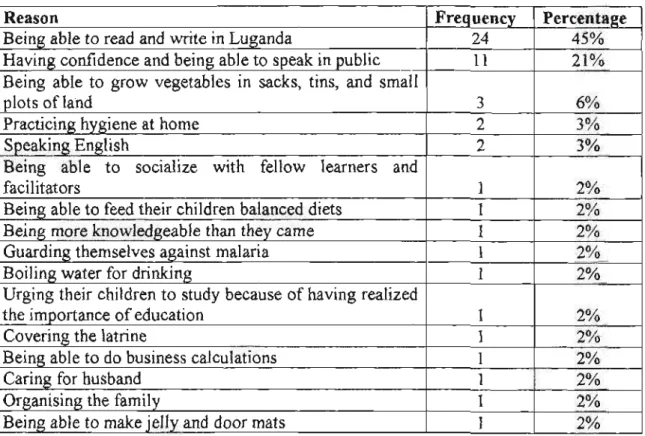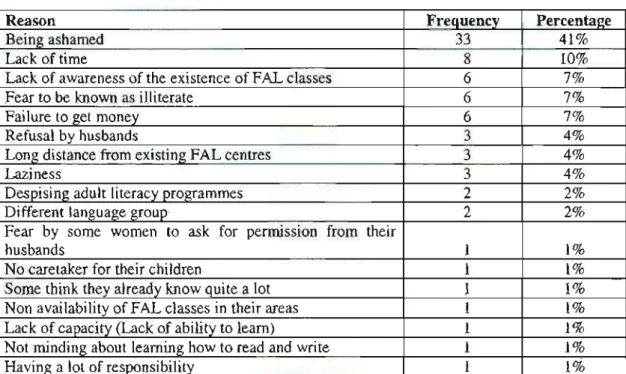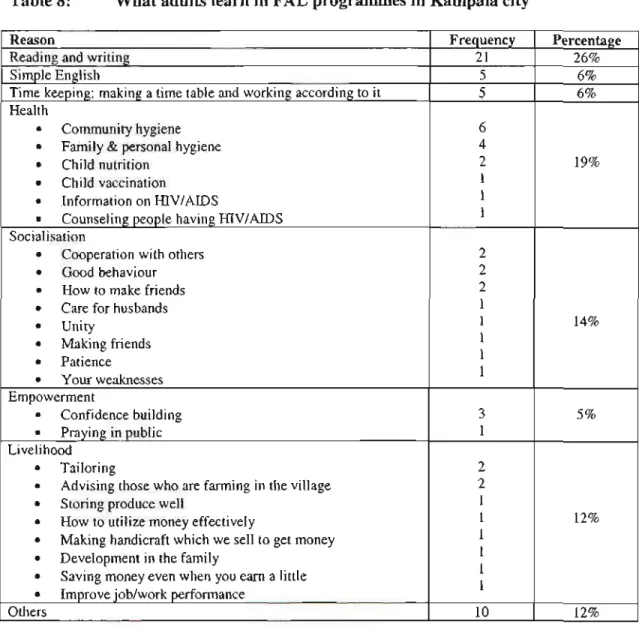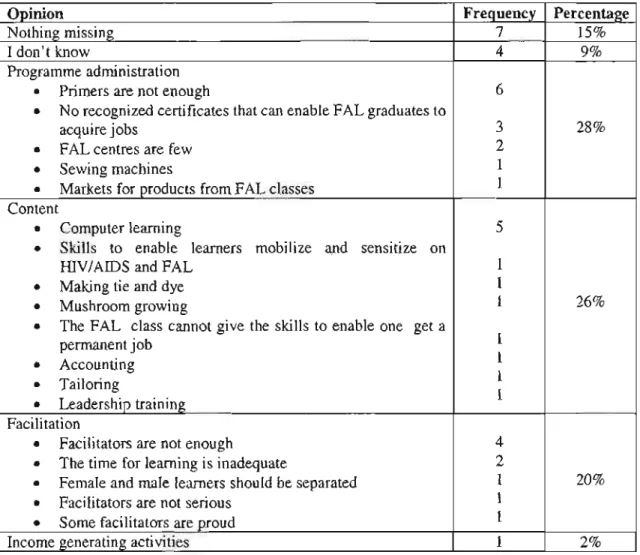This study analyzes adult learners' perceptions of functional adult literacy provision in six centers in Kampala city. 78 4.3.9 Reasons that motivated adult students to complete the program 79 4.3.10 Perceptions of adult students on what makes men drop out of the program.
CHAPTER ONE BACKGROUND
INTRODUCTION
On the other hand, participants may have negative perception due to the way the programs are organized. Makgwana Rampedi (2004) found out that some participants in the Ikwelo project in South Africa had negative attitudes towards literacy projects because the projects were designed with very little or no participation from the communities.
THE ADULT LITERACY SITUATION IN UGANDA
Baryayebwa in UNESCO (1997) gives the following brief history of functional adult literacy programs in Uganda. However, the provision of adult literacy programs in Uganda still falls far short of the need, and even the demand.
ADULT LITERACY PROVISION IN KAMPALA CITY .1 Brief Overview of adult literacy programmes in Kampala city
- Adult literacy materials used in the city
- Learner recruitment
- Learner involvement in programme management
- Strategies used in adult literacy programmes in Kampala city
- Main adult literacy approaches used in Kampala city
- Content
The city's adult literacy programs target low-income people and are designed to provide reading, writing, and math skills for economic, social, and political development. An integrated functional approach to adult literacy is the most appropriate approach for adult literacy programs in Uganda.
STATEMENT OF THE PROBLEM
PURPOSE OF THE STUDY
RESEARCH QUESTIONS
What is the adult students' perception of the use of knowledge and skills by those who have completed the functional adult education.
SCOPE OF THE STUDY
SIGNIFICANCE OF THE STUDY
In addition, no study has been conducted in Kampala city to explain what the adult learners think about the use of the knowledge and skills acquired in adult literacy programs in the fight against poverty. Results from the survey can contribute to increasing participation in the reading and writing programmes, as the adult students' perceptions, once they are known, can be handled positively.
THEORETICAL FRAMEWORK
Bhola (1994) argues that literacy initiatives, programs or campaigns should have a literacy system with subsystems that work harmoniously. Each individual subsystem and relationships between the subsystems play a decisive role in the entire system.
DEFINITION OF TERMS
Emphasis was placed on what motivates learners to enrol, strategies, approaches, methods and materials used in implementation, sites, facilities, equipment and the quality of facilitators that influence delivery, the extent to which programs address learners' needs adults, and the use of knowledge and skills by adult learners who had completed functional adult literacy programs. Perception How adult learners understand or think about how functional adult education is provided in the city of Kampala.
CHAPTER TWO LITERATURE REVIEW
WHAT MOTIVATES ADULTS TO ENROLL IN FUNCTIONAL ADULT LITERACY PROGRAMMES
1999) found in an evaluation of the functional adult literacy program in Uganda that a variety of reasons were given by the learners for joining literacy programs. The learners actually benefited from the adult literacy programs as they were able to use the literacy skills they had acquired for various reasons.
ADULT LITERACY PROVIDERS' STRATEGIES, APPROACHES, METHODS AND MATERIALS USED IN IMPLEMENTING ADULT
- Strategies
- Adult literacy approaches
- Adult literacy methods
- Bottom up methods
- Top down methods
- Eclectic methods
- Adult literacy materials
The origins of the methods can be traced back to the ancient Greeks and Romans (Lyster, 1992). The eclectic method integrates both top-down and bottom-up methods from the beginning of reading instruction (Lyster, 1992).
ADULT LEARNERS' VIEWS ON THE VENUES, FACILITIES, EQUIPMENT AND QUALITY OF FACDLITATORS
- Venues, facilities and equipment
- Quality of facilitators
Although Okech et al., (1999) cited the remoteness of most rural areas in Uganda as exerting a major influence on the physical availability of magazines in local languages, the case for urban areas may be different as there is a variety of reading materials, especially newspapers. . However, many of the reading materials are aimed at people with higher literacy levels and may not be useful for adults participating in adult literacy programs. In terms of training, more instructors working for NGOs than facilitators of the government FAL program had received initial facilitator training and refresher training from their own organizations or through outsourcing.
They revealed that when some of the instructors reached the practical parts that required a counselor, they skipped it because the counselors did not come and the learners suggested that there was a need to train instructors in this technical to train skills (Okech et al. 1999) ).
PERCEPTIONS OF THE EXTENT TO WHICH PROGRAMMES ADDRESS ADULT LEARNERS' NEEDS
- Unmet expectations and pledges
The students were asked to rate their instructors on attendance, punctuality, clarity, effort, use of learning materials, teacher-student relationship, making the lessons interesting, and whether or not the instructor brought in outside speakers.
USE OF THE KNOWLEDGE AND SKILLS BY THOSE WHO HAVE COMPLETED FUNCTIONAL ADULT LITERACY PROGRAMMES
- Writing
- Avoiding manipulation and cheating
- Other benefits of the programme .1 Improved family care
- Easy communication and getting along easily
- Adult learners assisting their children with school work
Those who had school-aged children reported that they read some of their children's reports, especially those written in their local language, and claimed that they were able to gauge their performance. The evaluation also revealed that some of the students were able to read signs in their mother tongue, Runyoro - one of the local Ugandan languages. We now feel motivated to attend meetings and are able to make suggestions during discussions.
According to them, avoiding manipulation has led to some increase in their income levels as they are able to protect themselves from fraud (Okechetal. 1999).
CHAPTER THREE
RESEARCH DESIGN AND METHODOLOGY
- INTRODUCTION
- RESEARCH DESIGN
- POPULATION AND SAMPLING STRATEGY
- RESEARCH METHODS
- RESEARCH INSTRUMENTS
- Validity of and reliability of instruments
- DATA COLLECTION
- DATA ANALYSIS AND PRESENTATION
- Editing
- Coding
- Tabulation
- RESEARCH PLAN AND TIMETABLE
- LIMITATIONS OF THE STUDY
- SUMMARY
Convenience sampling was used to select adult learners who had completed and those who had dropped out. It was used to check the responses of the respondents regarding the conditions of the learning centers. The focus group discussion guide contained questions that sought more in-depth information or views from the adult students.
Primary data was collected from adult learners still attending classes, those who dropped out and those who completed through the use of interviews and focus group discussions.
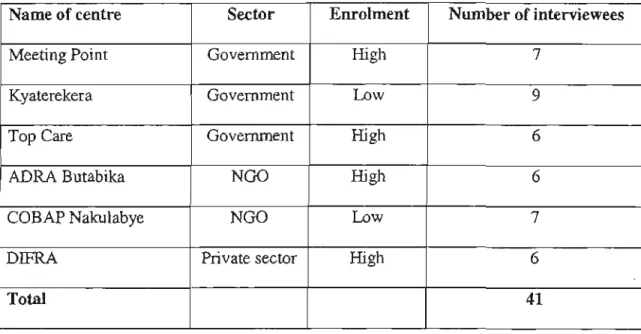
CHAPTER FOUR
PRESENTATION AND DISCUSSION OF FINDINGS
INTRODUCTION
BASIC INFORMATION
- The types providing agencies, names of centres and number of learners at each centre and schooling levels of respondents
- Medium of instruction
- Age characteristics of respondents
- Sex characteristics of respondents
- Schooling levels of respondents
- Year in which adult learners left school and reasons why they did
The center used the house of the local leader for the adult literacy and other activities. The learning of adult literacy skills is integrated with the learning of the above economic and social skills. The medium of instruction in the classes was Luganda although some of the learners were from other language groups.
The reason for leaving school, which was mentioned most often by those who had left school, was the lack of funds, which was mentioned by the majority of respondents (54%).
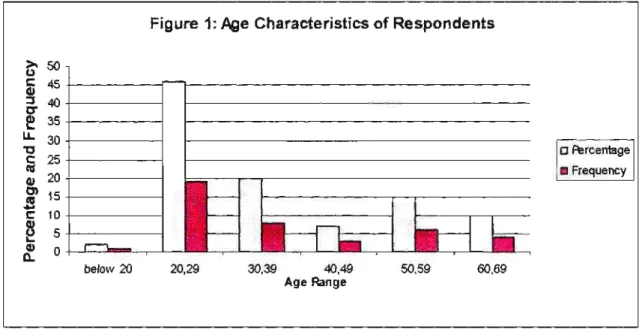
YEAR IN WHICH ADULT LEARNERS JOINED LITERACY CLASSES AND THEIR PERCEPTIONS OF WHAT MOTIVATES ADULTS TO
- Year in which adult learners joined functional adult literacy classes
- Adult learners' reasons for joining the functional adult literacy classes
- Adult learners' reasons as to whether they were satisfied they had gained what they had hoped from the classes and why
- Adult learners' opinions as to why other people join or do not join adult literacy classes
- Adult learners' opinions as to why all people in Kampala who cannot read, write and count well do not join functional adult literacy programmes
- What adults learn in FAL programmes in Kampala city
- Adult learners' views on what is missing from the functional adult literacy programme they are participating in
- What adult learners felt should not be included in the functional adult literacy programmes
- Reasons that motivated adult learners to complete the programme
- Adult learners' perceptions on what causes men to drop out of the functional adult literacy programmes
- Adult learners' perceptions on what causes women to drop out of the functional adult literacy classes
Adult students expressed their thoughts on why other people join adult literacy classes. Adult learners were asked to give their views on what is included in functional adult education programs that they felt should not be included. The study sought adult learners' perceptions of what causes men to drop out of functional adult literacy programs and their responses are presented in Table 11.
The adult learners were asked to give their opinion on what causes women to drop out of the functional adult literacy classes.
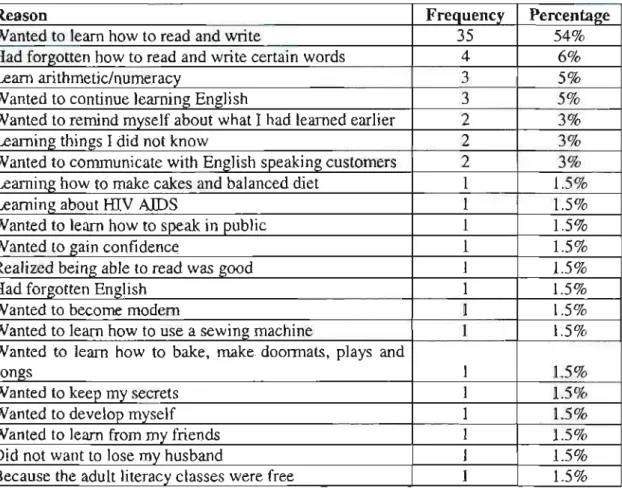
ADULT LEARNERS' VIEWS ON APPROPRIATENESS OF THE ADULT LITERACY PROVIDERS' STRATEGIES, APPROACHES, METHODS
- Appropriateness of the adult literacy providers' strategies used in adult literacy classes
- Appropriateness of the adult literacy providers' approaches used in adult literacy programmes
- Appropriateness of the adult literacy providers' methods used in adult literacy classes
- Learning materials provided by adult literacy providers for use in adult literacy classes
- The types of materials used in adult literacy classes
- Accessibility of learning materials
- Opinions on what adult learners would like to be added to the learning materials
When asked about the appropriateness of the strategies, the focus group discussions revealed that respondents believed that the literacy first approach was the preferred approach. The adult learners were asked about the suitability of the learning materials available and 85% said they were suitable, while 15% said they were not suitable. The table shows that 32% of responses indicated that the materials were suitable because they help students develop their reading, writing and arithmetic skills in Luganda and English.
8% of responses indicated that the content benefits students by helping them take good care of their families.
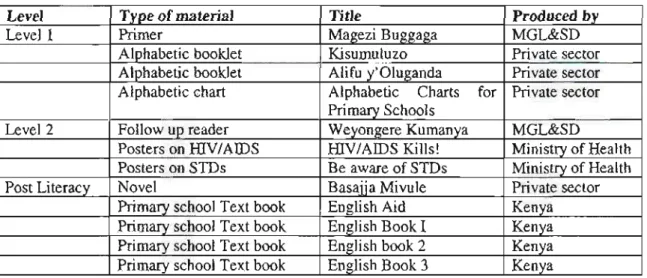
ADULT LEARNERS' VIEWS ON THE VENUES, FACILITIES &
- Distance from home to learning centre
- Mode of transport to the adult learning centre
- Fare paid by adult learners to travel to the learning centres
- Adult learners' views on the centres where the learning takes place
- The facilities and equipment at the adult learning centres
- Quantity and quality of facilitators of the functional adult literacy classes .1 Quantity of facilitators of the functional adult literacy classes
- Quality of facilitators
As shown, many respondents find the centers suitable for adults to learn, as reflected in the 74% of respondents who said they were either good or very good. Asked to give opinions about the facilities and equipment, 43% of the learners mentioned that the facilities and equipment were of good quality, 20% mentioned that they were of very good quality and 3% mentioned that they were modern. Some of the learners mentioned that these chairs and desks hurt their backs and legs.
From the answers, it can be concluded that adult students were generally satisfied with the amount of moderators and the quality of their work, despite the fact that the ratio between students and moderators was poor.
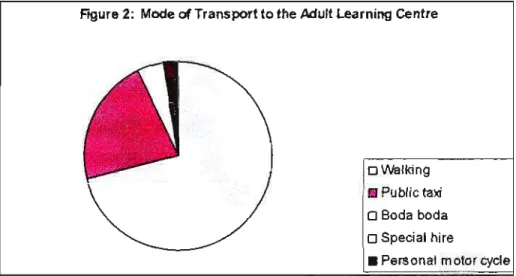
ADULT LEARNERS' PERCEPTIONS OF THE EXTENT TO WHICH THE PROGRAMMES ARE ADDRESSING THE ADULT LEARNERS'
- Extent to which adult learners felt the programme is addressing their needs The adult learners were asked what they thought about the extent to which the
- Reasons why some adult learners felt the programmes were addressing their needs
- Learner involvement in planning
- Problems faced by adult learners while participating in the programmes Respondents were asked to describe the problems they faced while participating in the
The table shows that 92% of responses indicated that adult learners felt that the programs were addressing their needs "to a greater extent", 4% indicated "somewhat". The reasons given were that what was taught in the classrooms addressed their needs and that literacy skills, once acquired, were useful for adult students. These responses suggest that although the programs were generally aimed at adult learners in Kampala, there may be room for improvement.
When asked if adult learners were involved in the planning, 76% agreed that they were, while 24% said they were not.
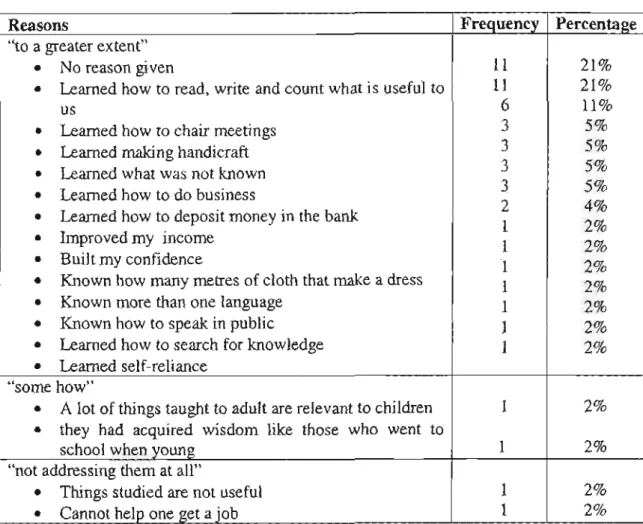
ADULT LEARNERS' PERCEPTIONS OF THE USE OF THE KNOWLEDGE AND SKILLS BY THOSE WHO HAVE COMPLETED
- How the knowledge and skills acquired in the functional adult literacy programmes were utilised in the adult learners' every day lives as given by
The time and number of days for learning should be increased. Government should provide sewing machines and fabrics for. The number of moderators should be increased. English needs to be improved to a higher level. Programs should provide post literacy. Improving program planning and management The government should provide support to adult education centres. The payment of fees should be stopped or at least reduced.
All people should be made aware of the importance of FAL More people should be mobilized to enroll in the programs.
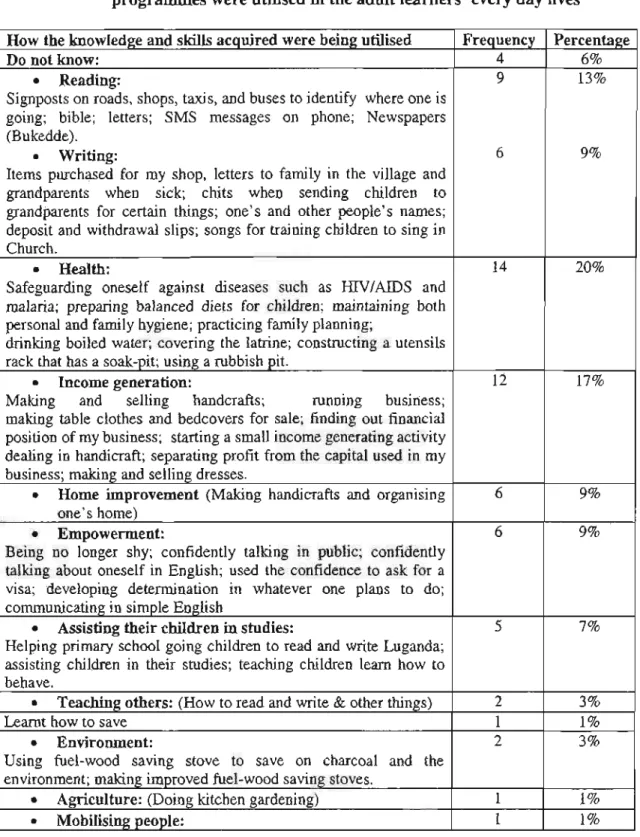
CHAPTER FIVE
SUMMARY, CONCLUSIONS AND RECOMMENDATIONS
- INTRODUCTION
- SUMMARY
- CONCLUSIONS
- RECOMMENDATIONS
From the findings of the study, it can be concluded that functional adult education programs in Kampala are suitable for adult learners. However, functional adult education programs can be improved by making more materials available and accessible to adult learners; and with content relevant to urban areas. The suitability of functional adult education programs can be judged by the usefulness of the knowledge and skills acquired and the satisfaction that students derive from the program.
The integrated approach to adult functional literacy needs to be strengthened as it is preferred by both the learners and the providing agencies.
Self-reported differences between a group of adults who participated in adult basic education programs and a group who did not. 2004) 'To be literate is to be someone': Adult education and poverty reduction in the perceptions of participants in literacy programs in Mozambique. Soifer, Irwin, Crumrine, Honzaki, Simmons and Young (1990) The Complete Theory to Practice: Handbook of Adult Literacy: Curriculum Design and Teaching Approaches. Participatory rapid assessment for community development: a training manual based on experiences in the Middle East and North Africa.
September Baoding, Hebei Province China: UNESCO Beijing Office, Chinese National Commission for UNESCO Ministry of Education, (pp. 45-47).
APPENDIX A
INTERVIEW SCHEDULE)
What is included in functional adult literacy programs that you think should not be included. In your opinion, does the functional adult literacy program meet the needs of adult learners in Kampala? Adult learners' perceptions of the use of knowledge and skills by those who have completed functional adult literacy programs.
Do you use the skills and knowledge acquired in functional adult literacy programs in your everyday life.
APPENDIX B
FOCUS GROUP DISCUSSION GUIDE)
INTRODUCTION
HOW FGDs WILL BE ORGANISED
TOPICS
Adult learners' views on the appropriateness of adult literacy providers' strategies, approaches, methods and materials used in the implementation of adult education programs in Kampala. Adult learners' views on adult literacy providers' strategies, approaches, methods, materials used in implementing functional literacy programs in Kampala. Description of the place where adult literacy classes are held (physical characteristics, location in relation to students' homes, facilities, etc.).
Views of adult learners on the facilitators of the functional adult literacy program (training, performance, attendance, workload, image, etc.).
APPENDIX C
OBSERVATION GUIDE)
APPENDIX D
ADULT LEARNERS' PERCEPTIONS OF FUNCTIONAL ADULT LITERACY PROVISION IN SIX CENTRES IN KAMPALA CITY,


